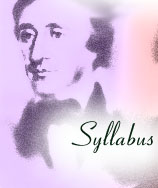
|
English 1001—Great American Authors |
|
Prof. John D. Schwetman |
||
| Spring 2000 | jschwetm@d.umn.edu/Tel. 726-6198 | |
| Cina 102 | Bohannon Hall 303 | |
| MWF 2-2:50pm | Office Hours: Wednesday 4-5pm | |
| <http://www.d.umn.edu/~jschwetm/w2000/engl1001/> | Thursday 3-4pm | |

|
English 1001—Great American Authors |
|
Prof. John D. Schwetman |
||
| Spring 2000 | jschwetm@d.umn.edu/Tel. 726-6198 | |
| Cina 102 | Bohannon Hall 303 | |
| MWF 2-2:50pm | Office Hours: Wednesday 4-5pm | |
| <http://www.d.umn.edu/~jschwetm/w2000/engl1001/> | Thursday 3-4pm | |
If we consider literature as purely a form of entertainment, then the notion that we must train ourselves to read might sound peculiar. Do you need training to watch television or see a movie? Obviously, not. You just watch and enjoy. Movies and TV let you get away from your problems and get caught up in adventure and romance. Nonetheless, all of you have been trained from a very young age as watchers of movies and TV shows, and as readers of texts. You know instinctively when the background music of a movie is signaling something shocking or when two characters are destined to fall in love. Through a steady diet of media, you have learned to read the language of gestures, camera angles, catch phrases and other techniques that artists use to communicate their ideas. You were probably unaware of these lessons at the time, but you depend on them now to interpret everything from a campaign advertisement to a computer game.
In this class, we will study literature that, being from the United States and from the nineteenth and twentieth centuries, will likely be quite familiar to you. At the same time, however, the works will require you to think about how you interpret them. We will begin with a collection of poems by Robert Frost, and we will focus on minute details in Frost's language as we attempt to understand the various layers of meaning in his poetry.
Poetry is an important starting point, because poets are so good at making the familiar unfamiliar and at requiring us to pay close attention to the use of language. We will then apply similar techniques of interpretation to Edith Wharton's House of Mirth and Nella Larsen's Quicksand, two works of fiction that use language to create a whole world of interacting characters to convey a story about love and identity. We then take a step further back into the nineteenth century to consider the works of Henry David Thoreau and Mark Twain. We will conclude with a play by Eugene O'Neill and a final collection of poems by Sylvia Plath. Throughout our study of these works from a variety of social perspectives and genres, we will investigate the tools these authors use to entertain us as well as to enlighten us.
| Short Paper—4-5 page analysis of one poem by Robert Frost | 10% |
| Long Paper—6-7 page paper on one work in this class | 30% |
| Mid-term Exam—Identification and Short Essays | 25% |
| Final Examination—Identification and Short Essays on works from the whole semester | 35% |
I expect students to show up to class on time and prepared to discuss the reading material for that day, though I will not be able to take role every day for a class of this size. Missing class means missing the occasional informal assignment and important materials that will appear on exams. If you must miss multiple classes, please do not hesitate to send me an e-mail message to find out about the reading materials for the subsequent classes.
Your grade will depend primarily on your written work and the understanding of the material that you convey through that work. A command of standard written English and the ability to present an argument will also contribute to the determination of your grade. Any infractions against UMD's Scholastic Dishonesty provisions in the Student Conduct Code as stated in the UMD catalogue will receive serious attention and appropriate penalties.
Individuals who have any disability, either permanent or temporary, which might influence their ability to perform in this class, are encouraged to inform me at the start of the quarter. I can make special adaptations of teaching methods, assignments, materials, or testing as required to provide for equitable participation in the course. The Access Center is also available to assist students with disabilities. It is located in 138 Library and on the web at <http://www.d.umn.edu/access>.